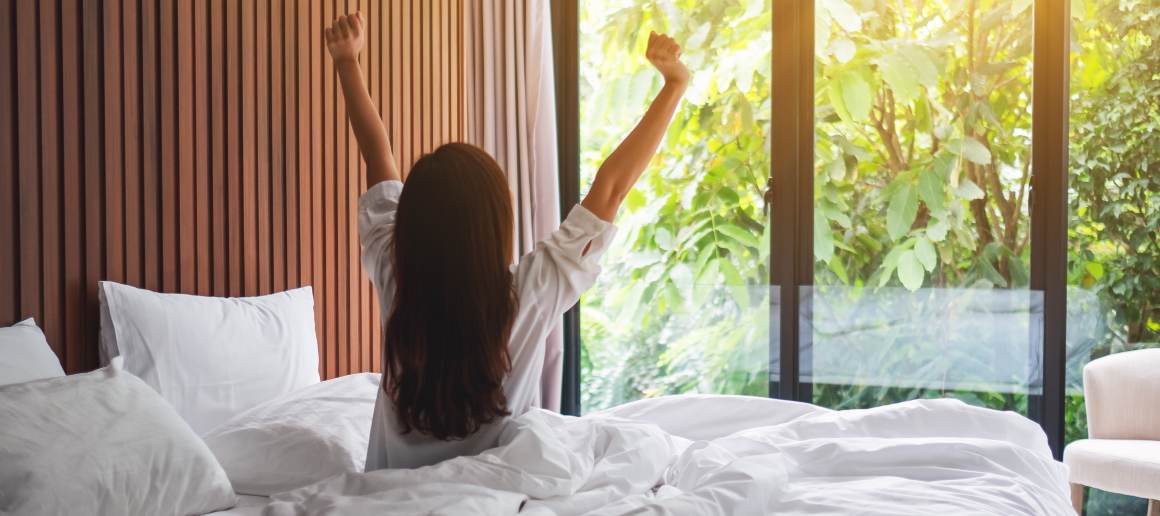Master Your Bedtime Routine for Great Sleep Tonight
Published:
A well-designed bedtime routine can work wonders for your sleep quality and overall well-being. It sets the stage for a peaceful night's rest, helps establish healthy sleep habits, and promotes good sleep hygiene. By incorporating a few key elements into your routine, you can optimize your sleep and wake up feeling refreshed and rejuvenated.
Contents:
- Key Takeaways:
- The Importance of Sleep Hygiene
- Creating a Consistent Bedtime and Wake-up Time
- Putting Away Electronic Devices
- Incorporating Relaxation Techniques
- The Power of a Warm Bath
- Reading or Journaling
- Complete Table:
- Creating a Sleep-friendly Bedroom Environment
- Lifestyle Factors for a Better Night's Sleep
- Conclusion
-
FAQ
- Q: What is the importance of having a bedtime routine?
- Q: What are some key elements to include in a bedtime routine?
- Q: Why is it important to put away electronic devices before bed?
- Q: How can relaxation techniques be incorporated into a bedtime routine?
- Q: What are the benefits of taking a warm bath before bed?
- Q: How can reading or journaling before bed improve sleep quality?
- Q: How can I create a sleep-friendly bedroom environment?
- Q: Are there any lifestyle factors that can affect sleep quality?
- Source Links

Here are some sleep tips to enhance your bedtime routine:
Key Takeaways:
- Set a consistent bedtime and wake-up time to regulate your body's natural sleep-wake cycle.
- Avoid electronic devices at least an hour before bed to limit the disruptive effects of blue light on sleep quality.
- Incorporate relaxation techniques, such as deep breathing or meditation, to relax the mind and prepare for sleep.
- Consider taking a warm bath to promote relaxation and enhance sleep quality.
- Engage in calming activities, such as reading a book or journaling, to shift your focus away from daily stressors and promote tranquility.
By implementing these sleep tips into your bedtime routine, you can create a conducive environment for sleep and improve your overall sleep quality. Remember, consistency is key, so try to stick to your routine as much as possible to reap the maximum benefits.
The Importance of Sleep Hygiene
Practicing good sleep hygiene is essential for optimizing your sleep and ensuring you wake up feeling refreshed. Sleep hygiene refers to a set of healthy sleep habits and routines that promote quality sleep. By incorporating these habits into your bedtime routine, you can improve the quantity and quality of your sleep, leading to better overall well-being.
One important aspect of sleep hygiene is maintaining a consistent sleep schedule. Going to bed and waking up at the same time every day helps regulate your body's internal clock, allowing you to fall asleep more easily and wake up feeling more refreshed. This consistency reinforces your natural sleep-wake cycle and can help improve the overall quality of your sleep.
Another crucial element of sleep hygiene is creating a sleep-friendly bedroom environment. This means ensuring your sleeping space is comfortable, quiet, and dark. Consider investing in a supportive mattress and pillows, using blackout curtains or an eye mask to block out light, and reducing noise and distractions as much as possible. Creating a relaxing atmosphere in your bedroom can help signal to your brain that it's time to wind down and prepare for sleep.
The Role of a Bedtime Routine
In addition to sleep schedule and bedroom environment, establishing a consistent bedtime routine can greatly enhance sleep hygiene. A bedtime routine is a series of relaxing activities that you engage in before going to bed. It helps signal to your body and mind that it's time to unwind and prepare for sleep.
Consider incorporating activities such as reading a book, taking a warm bath, practicing relaxation techniques like deep breathing or meditation, or listening to calming music. These activities can help reduce stress and anxiety, promoting a sense of relaxation and tranquility that will aid in falling asleep more easily.
By prioritizing sleep hygiene and creating a bedtime routine that works for you, you can improve the quality and duration of your sleep. Remember, consistency is key, so stick to your routine and give your body the rest it needs for optimal health and well-being.
Creating a Consistent Bedtime and Wake-up Time
Establishing a regular sleep schedule by setting consistent bedtime and wake-up times can help regulate your body's internal clock and improve your sleep quality. When you go to bed and wake up at the same time every day, even on weekends, you train your body to recognize when it's time to sleep and when it's time to wake up. This consistency helps to synchronize your natural sleep-wake cycle, also known as your circadian rhythm.
A consistent sleep schedule allows your body to prepare for sleep by releasing the hormone melatonin at the same time each night. This hormone helps regulate your sleep and wake cycles. By adhering to a regular sleep schedule, you may find it easier to fall asleep and wake up refreshed in the morning.
To establish a consistent bedtime and wake-up time, determine the number of hours of sleep you need each night and work backward from your desired wake-up time. It's recommended that adults aim for 7-9 hours of sleep per night. For example, if you need to wake up at 7 am and you want 8 hours of sleep, your bedtime should be 11 pm. Stick to this schedule as closely as possible, even on weekends or days off, to maintain the benefits of a consistent sleep routine.
| Benefits of a Consistent Sleep Schedule |
|---|
| Improved sleep quality |
| Enhanced alertness and productivity during the day |
| Reduced daytime sleepiness |
| Increased energy levels |
| Reduced risk of sleep disorders |
Putting Away Electronic Devices
Electronic devices emit blue light, which can interfere with your body's production of melatonin, a hormone that regulates sleep. To ensure a restful night's sleep, it's important to put away your electronic devices at least an hour before bed. This includes smartphones, tablets, laptops, and televisions. Instead of scrolling through social media or watching videos, try engaging in activities that promote relaxation and wind down your mind.
Here are some tips to help you wind down before bed:
- Read a book: Reading a book (preferably outside the bedroom) can help shift your focus away from daily stressors and promote a sense of tranquility.
- Write a to-do list or journal: Taking a few minutes to write down your thoughts, concerns, or tasks for the next day can help clear your mind and alleviate any anxiety or tension.
- Listen to calming music: Playing soothing music can create a peaceful ambiance in your bedroom and help you relax before sleep.
- Practice relaxation techniques: Deep breathing exercises, meditation, or gentle stretching can help calm your mind and prepare your body for sleep.
By incorporating these activities into your bedtime routine and avoiding electronic devices, you can create a more relaxed environment and signal to your brain that it is time to wind down and prepare for sleep.
| Benefits of Putting Away Electronic Devices |
|---|
| Improved melatonin production |
| Reduced exposure to blue light |
| Enhanced relaxation and stress reduction |
| Better sleep quality and duration |
Incorporating Relaxation Techniques
Including relaxation techniques in your bedtime routine, such as deep breathing exercises, meditation, or listening to calming music, can help calm your mind and prepare your body for a restful sleep. These techniques promote relaxation by reducing stress and anxiety, allowing your body to enter a state of tranquility.
Deep breathing exercises, also known as diaphragmatic breathing, involve taking slow, deep breaths, filling your lungs and abdomen with air, and then exhaling slowly. This technique activates the body's relaxation response, lowering your heart rate and promoting a sense of calm as you prepare for sleep. You can practice deep breathing by lying in bed, closing your eyes, and focusing on your breath, inhaling deeply through your nose and exhaling through your mouth.
Meditation is another effective technique for relaxation. By focusing your attention and quieting your mind, meditation helps reduce racing thoughts and promotes a sense of inner peace. You can try different meditation techniques, such as mindfulness meditation or guided imagery, by following online resources or using mobile apps specifically designed for meditation practice. Find a quiet and comfortable spot in your bedroom or create a designated meditation space to enhance the calming effect.
Calming Music for Better Sleep
Listening to calming music is a simple yet powerful way to unwind and promote relaxation. Choose slow, soothing melodies with soft instrumental sounds or nature sounds like ocean waves or rain. Avoid songs with lyrics or intense beats, as they can be stimulating and disrupt your sleep. Create a bedtime playlist that you can listen to as part of your routine, allowing the music to lull you into a peaceful state before drifting off to sleep. Consider using a wireless Bluetooth speaker or headphones for an immersive listening experience without disturbing your sleep partner.
| Relaxation Techniques | Benefits |
|---|---|
| Deep breathing exercises | Reduces stress and anxiety |
| Meditation | Promotes inner peace and quiets the mind |
| Listening to calming music | Facilitates relaxation and soothes the senses |
By incorporating these relaxation techniques into your bedtime routine, you can create a peaceful and calming environment that prepares your mind and body for a restful sleep. Experiment with different techniques and find what works best for you. Remember to be consistent and prioritize self-care to ensure a rejuvenating sleep night after night.
The Power of a Warm Bath
A warm bath before bed can not only help you unwind after a long day but also promote a sense of calm and ease tension, setting the stage for a peaceful sleep. The soothing warmth of the water can relax your muscles and release any physical and mental stress you may be carrying. It is a simple yet effective bedtime ritual that can enhance the quality of your sleep.
To make the most of your warm bath, consider adding some relaxing essential oils like lavender or chamomile. The gentle scent can further enhance the calming effect and create a serene atmosphere in your bathroom. You can also dim the lights or light a few candles to create a cozy ambiance.
While soaking in the warm water, take this opportunity to disconnect from the distractions of the day. Leave your phone outside the bathroom and focus on being present in the moment. You can listen to some soft music or engage in deep breathing exercises to quiet your mind and prepare it for a restful slumber.
| Benefits of a Warm Bath as Part of Your Bedtime Routine |
|---|
| Relaxes muscles and reduces tension |
| Promotes a sense of calm and tranquility |
| Enhances the quality of sleep |
| Creates a soothing and peaceful atmosphere |
Remember, a warm bath should be a part of a comprehensive bedtime routine that includes other relaxation techniques and sleep-friendly habits. By incorporating this simple ritual into your routine, you can signal to your body and mind that it is time to unwind and prepare for a restful sleep.
Reading or Journaling
Reading a book or writing in a journal before bed can be an effective way to disconnect from the day's events and relax the mind, allowing for a smoother transition into sleep. By immersing yourself in a captivating book, you can shift your focus away from the stresses of the day and enter a world of imagination. Choose a book that is not too thrilling or suspenseful, as this can have the opposite effect and keep you awake.
If reading isn't your preferred activity, journaling can be a great alternative. Writing down your thoughts, feelings, and worries can help declutter your mind and provide a sense of closure for the day. Consider keeping a gratitude journal, where you jot down a few things you are grateful for each night. This practice can shift your mindset towards positivity and promote a sense of tranquility, making it easier to fall asleep.
Benefits of Reading or Journaling
- Provides a mental and emotional escape from daily stressors
- Promotes relaxation and calmness
- Reduces racing thoughts and promotes better sleep quality
- Allows for self-reflection and personal growth
- Enhances creativity and imagination
Remember to create a peaceful environment for your reading or journaling session. Dim the lights, play some soft background music, and find a comfortable spot where you can fully immerse yourself in the activity. By incorporating reading or journaling into your bedtime routine, you can set the stage for a restful night's sleep.
Complete Table:
| Bedtime Routine Element | Benefits |
|---|---|
| Reading a book | Provides an escape from stress and promotes relaxation |
| Writing in a journal | Helps declutter the mind and promotes a sense of closure |
Creating a Sleep-friendly Bedroom Environment
A conducive sleep environment plays a crucial role in promoting restful sleep, and simple adjustments in your bedroom can make a significant difference in your sleep quality. Here are some sleep hygiene tips to create a sleep-friendly bedroom:
- Keep it dark: Use blackout curtains or shades to block out any external light that may disrupt your sleep. Consider using an eye mask if necessary.
- Manage noise levels: Use earplugs or a white noise machine to drown out any disruptive sounds. If you live in a noisy area, consider soundproofing your walls or using a fan for background noise.
- Optimize temperature: Keep your bedroom cool, ideally between 60-67 degrees Fahrenheit (15-19 degrees Celsius), as a cooler environment promotes better sleep. Use a fan or air conditioner if needed.
- Invest in a comfortable mattress and pillows: Your bed should provide proper support and comfort. Consider investing in a high-quality mattress and pillows that suit your preferences.
Additionally, take note of the following:
- Remove electronic devices: Keep electronic devices such as smartphones, tablets, and TVs out of the bedroom. The blue light emitted by screens can disrupt your sleep pattern.
- Declutter your space: A cluttered bedroom can contribute to a cluttered mind. Keep your space clean, organized, and free of distractions.
- Create a calming atmosphere: Use soothing colors, such as soft blues or neutral tones, for your bedroom decor. Incorporate relaxation elements like candles, essential oils, or calming artwork to create a peaceful ambiance.
By implementing these sleep hygiene tips and making your bedroom a sleep-friendly sanctuary, you can create an environment that promotes restful sleep and enhances your overall sleep quality.
Lifestyle Factors for a Better Night's Sleep
Beyond having a bedtime routine, certain lifestyle factors can significantly impact your sleep quality, and being mindful of these can help you maximize the benefits of your bedtime routine. Here are some additional tips to consider:
- Avoid caffeine and alcohol before bed: Both caffeine and alcohol can interfere with your sleep patterns and make it harder to fall asleep. It's best to avoid these substances in the hours leading up to bedtime.
- Limit intense exercise in the evening: While regular exercise is beneficial for sleep, intense workouts close to bedtime can stimulate your body and make it difficult to wind down. Try to schedule your workouts earlier in the day.
- Turn off screens: The blue light emitted by electronic devices can disrupt your body's production of melatonin, a hormone that regulates sleep. Avoid using screens at least an hour before bedtime to promote better sleep.
Incorporating these lifestyle factors into your bedtime routine can have a significant impact on your sleep quality. By avoiding caffeine and alcohol, limiting intense exercise in the evening, and turning off screens, you can create a more sleep-friendly environment and enhance the benefits of your routine.
Remember, everyone is different, and it may take some trial and error to find the combination of lifestyle factors that work best for you. Pay attention to how these changes affect your sleep patterns and adjust accordingly. With time and consistency, you can develop healthy sleep habits that contribute to a better night's sleep.
Conclusion
By implementing a tailored bedtime routine and incorporating the tips shared in this article, you can transform your sleep and wake up feeling rejuvenated and ready to embrace the day. Having a bedtime routine is crucial for getting a good night's sleep. Some key elements to include in your routine are setting a consistent bedtime and wake-up time, putting away electronic devices at least an hour before bed, having a light snack or bedtime tea, taking a warm bath, listening to calming music, practicing relaxation techniques like deep breathing or meditation, reading a book (preferably outside the bedroom), writing a to-do list or journaling, and creating a sleep-friendly bedroom environment.
Other tips include avoiding caffeine and alcohol before bed, limiting intense exercise in the evening, and turning off screens to avoid the stimulating effects of blue light. These lifestyle factors can significantly impact your sleep quality. By incorporating these elements into your bedtime routine, you can create habits that signal to your brain that it is time to wind down and prepare for sleep.
Remember, a consistent sleep schedule, along with a relaxing bedtime routine, is essential for maintaining good sleep hygiene. By prioritizing these habits, you can optimize your sleep and reap the benefits of improved physical and mental well-being.
FAQ
Q: What is the importance of having a bedtime routine?
A: Having a consistent bedtime routine is crucial for getting a good night's sleep. It helps signal to your brain that it is time to wind down and prepare for sleep.
Q: What are some key elements to include in a bedtime routine?
A: Some key elements to include in a bedtime routine are setting a consistent bedtime and wake-up time, putting away electronic devices at least an hour before bed, having a light snack or bedtime tea, taking a warm bath, listening to calming music, practicing relaxation techniques like deep breathing or meditation, reading a book (preferably outside the bedroom), writing a to-do list or journaling, and creating a sleep-friendly bedroom environment.
Q: Why is it important to put away electronic devices before bed?
A: Electronic devices emit blue light, which can suppress the production of the sleep hormone melatonin and disrupt sleep. Putting away electronic devices at least an hour before bed helps promote relaxation and better sleep quality.
Q: How can relaxation techniques be incorporated into a bedtime routine?
A: Relaxation techniques like deep breathing, meditation, or listening to calming music can be incorporated into a bedtime routine to help relax the mind and body before sleep. These techniques can reduce stress and anxiety, promoting a more peaceful sleep.
Q: What are the benefits of taking a warm bath before bed?
A: Taking a warm bath before bed can induce a sense of relaxation and promote better sleep. The rise in body temperature followed by a drop in temperature after the bath can help signal to the body that it is time to sleep.
Q: How can reading or journaling before bed improve sleep quality?
A: Engaging in reading or journaling before bed helps shift the focus away from daily stressors and allows the mind to unwind. It can create a sense of tranquility and promote a more restful sleep.
Q: How can I create a sleep-friendly bedroom environment?
A: To create a sleep-friendly bedroom environment, make sure your bedroom is cool, dark, and quiet. Use curtains or blinds to block out external light, consider using earplugs or a white noise machine to minimize noise disturbances, and ensure your mattress, pillows, and bedding are comfortable and supportive.
Q: Are there any lifestyle factors that can affect sleep quality?
A: Yes, certain lifestyle factors can affect sleep quality. It is best to avoid consuming caffeine and alcohol before bed as they can interfere with sleep. Additionally, it is recommended to limit intense exercise in the evening as it can stimulate the body and make it harder to fall asleep.


















